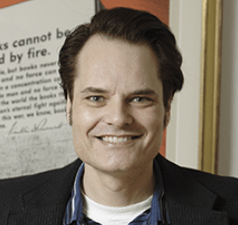David McRaney's Blog, page 12
September 20, 2021
How to make your job suck less by understanding what kind of jerk you are at work and what kind of work jerk most-easily persuades you
In this live taping of the podcast, Dr. Tessa West, the author of Jerks at Work conducts quizzes to see what kind of jerk you are and what kind of jerk most-easily persuades you in the workplace. You will also learn how to counteract the behaviors of people who make work suck more than it should. And you’ll hear about research into remote-working, the best way to ask for a raise, networking, team building and more.

West is a leading expert on interpersonal interaction and communication and will explain how to make work suck less as we return to our offices and figure out how to balance working remotely with working in-person after a year of re-imagining what work even means. West’s new book is an exploration of all the psychological research into how and why gaslighters, bulldozers, neglectors, micromanagers and more do their thing in our workplaces and how to use what we know from decades of psychological research to counteract their Machiavellian machinations.
ABOUT JERKS AT WORK:
For anyone pulling their hair out over an irritating colleague who’s not technically breaking any rules, a hilarious guide to getting difficult people off your back from NYU psychology professor Tessa West
Ever watched a coworker charm the pants off management while showing a competitive, Machiavellian side to the lower ranks? The Kiss-Up/Kick-Down coworker doesn’t hesitate to throw peers under the bus, but their boss is oblivious to their bad behavior. What to do? In Jerks at Work, West draws on a decade of original research to profile classic workplace archetypes, including the Gaslighter, the Bulldozer, the Credit-Stealer, the Neglector, and the Micromanager, and gives advice to anyone who’s ever cried in a bathroom stall at the office.
West digs deep into the inner workings of each bad apple, exploring their motivations and insecurities–for instance, micromanagers develop compulsive habits due to poor managerial training and public shaming–and offers clever strategies for stopping each type of jerk in their tracks, such as:
• Bulldozers often gain extra influence in meetings by making sure they’re the first person to talk, even by saying “let’s start by all sharing our names,” which research shows portrays them as powerful. Don’t let them speak first!
• Kiss-Up/Kick-down coworkers are so endeared to their managers that, if you have to report them, do it in small doses over time–otherwise, you’ll trigger cognitive dissonance in your brainwashed boss.
Jerks at Work is the playbook that you wish you didn’t need but you’ll always turn to–and the answer to your endless “how to deal with a terrible boss” Google searches.
Links and Sources
Tessa WestJerks at WorkCaveat in NYCSeptember 3, 2021
YANSS 214 – Exploring Genius
Over the course of this audio documentary series, David McRaney explores the history and science of intelligence, IQ, and remarkable talent through interviews with dozens of intelligence experts and actual “geniuses” (a 5-year-old prodigy, the man with the highest IQ ever recorded, etc). McRaney wrestles with the complexity of GENIUS as a cultural construct and considers how we can unlock its positive potential within ourselves.
LINK TO GET THE HEAR FIRST EPISODE AND GET TWO-WEEKS OF HIMALAYA FOR FREE
What You’ll Learn:
– The history of the word and concept of genius
– How genius gets measured and defined
– What life is like for geniuses, in the past, now and in the future
From the creator of YANSS, a new 6-part, 7-hour audio documentary exploring the science and history of the idea and word, “genius,” featuring dozens of interviews with experts and those with extraordinary talents and extreme intelligence.
August 23, 2021
YANSS 213 – How to improve your chances of nudging the vaccine hesitant away from hesitancy and toward vaccination
In this episode of the You Are Not So Smart Podcast, we sit down with nine experts on communication, conversation, and persuasion to discuss the best methods for reaching out to the vaccine hesitant with the intention of nudging them away from hesitancy and toward vaccination.
Mentioned in the show, here is the link to a free online class with Misha Glouberman where you will learn how to have better conversations with the vaccine hesitant: LINK
This is the fourth episode of the podcast focused on the psychology behind various aspect of the COVID pandemic.
 Dr. Brooke Harrington
Dr. Brooke HarringtonDr. Brooke Harrington is a professor of sociology at Darmouth who studies the sociology of fraud and is the author of Capital without Borders. She writes for the Guardian, The Washington Post, The New York Times and The Atlantic. This is her most recent article about vaccine hesitancy.
TWITTER: @EBHarrington
 Misha Glouberman
Misha GloubermanMisha Glouberman teaches people how to talk about things, both in the classroom and within organizations, and he also works as a professional facilitator, which means he helps people design and run conferences and meetings. He also lectures, hosts Trampoline Hall (which has a podcast) – where he interviews the speakers afterfield and fields questions from the audience – and he is the co-author of the book The Chairs Are Where the People Go, a collection of his dictated musings about life recorded and edited by author Sheila Heti. Click here for a free class on vaccine hesitancy.
TWITTER: @mishaglouberman
 Karin Tamerius
Karin TameriusKarin Tamerius is a political psychiatrist and the founder of Smart Politics, an organization devoted to helping progressives have better conversations among people with whom they disagree. She also helped create the UncleBot.
TWITTER: @tamerius
 Anthony Magnabosco
Anthony MagnaboscoAnthony Magnabosco has been practicing and promoting Street Epistemology since 2013. Anthony has had several hundred chats (many of them on camera and uploaded to his YouTube channel) on a variety of claims including Gods, ghosts, karma, law of attraction, and a variety of social and political topics.
TWITTER: @magnabosco
 CLICK THIS FOR FREE TICKET
CLICK THIS FOR FREE TICKET
Download – iTunes – Stitcher – RSS – Spotify – Patreon – Soundcloud – Omny

Support the show directly by becoming a patron! Get episodes one-day-early and ad-free. Head over to the YANSS Patreon Page for more details.

Links and Sources
Download – iTunes – Stitcher – RSS – Spotify – Patreon – Soundcloud – Omny
Music: Banjopocalypse and Caravan Palace
August 8, 2021
Exploring Genius
Over the course of this audio documentary series, David McRaney explores the history and science of intelligence, IQ, and remarkable talent through interviews with dozens of intelligence experts and actual “geniuses” (a 5-year-old prodigy, the man with the highest IQ ever recorded, etc). McRaney wrestles with the complexity of GENIUS as a cultural construct and considers how we can unlock its positive potential within ourselves.
LINK TO GET THE HEAR FIRST EPISODE AND GET TWO-WEEKS OF HIMALAYA FOR FREE
What You’ll Learn
– The history and concept of genius
– How genius gets measured and defined
– What life is like for geniuses, now and in the future
From the creator of YANSS, a new 6-part, 7-hour audio documentary exploring the science and history of the idea and word, “genius,” featuring dozens of interviews with experts and those with extraordinary talents and extreme intelligence.
See YANSS live in-person or streaming at Caveat in NYC on August 13th
FRI // AUG 13 // 07:00PM
You Are Not So Smart is a celebration of self delusion, a psychology podcast that dives deep into the normal but often strange ways we all delude ourselves.
In this live taping, science journalist and host David McRaney will sit down with psychologist Dr. Tessa West, the author of Jerks at Work, and together they will conduct quizzes to see what kind of jerk you are and what kind of jerk most-easily persuades you in the workplace. You will also learn how to counteract the behaviors of people who make work suck more than it should. In addition, you’ll play psychology games revealing your biases, hear about research into remote-working, the best way to ask for a raise, networking, team building and more!
West is a leading expert on interpersonal interaction and communication and will explain how to make work suck less as we return to our offices and figure out how to balance working remotely with working in-person after a year of re-imagining what work even means. West’s new book is an exploration of all the psychological research into how and why gaslighters, bulldozers, neglectors, micromanagers and more do their thing in our workplaces and how to use what we know from decades of psychological research to counteract their Machiavellian machinations.
BUY TICKETS HERE
 SHOW INFO
SHOW INFODoors 6:30 PM, show 7:00 PM.
Tickets $20 in advance, $25 at the door, $5 livestream.
21+
No outside food or drink is allowed.
Livestream ticket informationIf you purchase a livestream ticket, Eventbrite will automatically email you a private YouTube link to the stream on the day of the show. If you have not received the private link by the show start time, please contact us for the link.
COVID POLICIESAs we re-open we’re doing everything we can to keep our audience, performers, and staff safe and are complying with all Covid regulations.
As part of this, all attendees must present proof of full vaccination to enter. Proof can be via the New York State Excelsior pass, a physical copy of the CDC card, a photo of your CDC card, or other electronic record of vaccination includes name and date (e.g., some chain pharmacies have an app with this information). In all cases the name must match that on your photo ID.
Our full Covid policies can be found here.
REFUND POLICYTickets may be refunded up to 24 hours before the event. Within 24 hours we may take exchanges for other events at our discretion. No refunds after the event.
YANSS 212 – How social identities make a stinky shirt smell better, a vaccine seem dangerous, and a cult leader seem trustworthy
In this episode of the You Are Not So Smart Podcast, we sit down with psychologist Jay Van Bavel to discuss his new book, The Power of Us, an exploration of “the dynamics of shared, social identities. What causes people to develop social identities? What happens to people when they define themselves in terms of group memberships? Under what conditions does the human proclivity to divide the world into “us” and “them” produce toxic conflict and devastating discrimination? And how can shared identities instead be harnessed to improve performance, increase cooperation, and promote social harmony?”

 Dr. Jay Van Bavel
Dr. Jay Van BavelDr. Jay Van Bavel is an Associate Professor of Psychology and Neural Science with an affiliation at the Stern School of Business in Management and Organizations at New York University. Prior to coming to NYU, Jay completed his PhD at the University of Toronto. He is the author of “The Power of Us: Harnessing our social identities to improve performance, increase cooperation, and promote social harmony” (with Dominic Packer).
Jay’s is the Director of the NYU Social Identity & Morality Lab and has won several awards for his research on how collective concerns shape the brain and behavior. From neurons to social networks, he has published over 100 academic papers on the psychology and neuroscience of implicit bias, diversity and inclusion, group identity, team performance, cooperation, decision-making, and public health. His research has been cited in the US Supreme Court and Senate, and United Nations.
Jay has written about his research for the public in the BBC, Harvard Business Review, New York Times, Wall Street Journal, Washington Post, and Scientific American. He has appeared on Through the Wormhole (with Morgan Freeman), Why We Hate (by Stephen Spielberg), CBC News, MSNBC, and NBC News, been interviewed on NPR, WNYC, and Bloomberg News, and had his research featured in international media. He also writes a career advice column for Science Magazine.
Jay teaches one the largest courses at NYU and recently received the Golden Dozen Teaching Award. He has given invited talks and keynotes at many of the top psychology departments and business schools (e.g., Stanford, Harvard, Columbia, Oxford), international conferences (e.g., TEDx, World Health Organization, World Science Festival).
TWITTER: @jayvanbavel


Support the show directly by becoming a patron! Get episodes one-day-early and ad-free. Head over to the YANSS Patreon Page for more details.

Links and Sources
Download – iTunes – Stitcher – RSS – Spotify – Patreon – Soundcloud – Omny
Using social and behavioural science to support COVID-19 pandemic response
July 26, 2021
YANSS 211 – How the psychology that leads people into QAnon can help us understand not only what leads people into a conspiracy community, but which community and why
Download – iTunes – Stitcher – RSS – Soundcloud – Omny – Spotify
When we talk about conspiracy theories we tend to focus on what people believe instead of why, and, more importantly, why they believe those things and not other things. In this episode, we sit down with two psychologists working to change that, and in addition, change the term itself from conspiracy theory to conspiracy narrative, which more accurately describes what makes any one conspiracy appealing enough to form a community around it and in rare cases result in collective action.

Joseph Uscinski is an associate professor of political science at the University of Miami. He studies public opinion and mass media, with a focus on conspiracy theories and related misinformation. His recent article for The Guardian argues that QAnon is not growing, nor is is a right-wing conspiracy theory. He is the coauthor of American Conspiracy Theories and editor of Conspiracy Theories and the People Who Believe Them.

Anni Sternisko is a doctoral candidate at New York University studying conspiracy theory beliefs, social identity and moral judgment. Her recent paper titled: The dark side of social movements: Social identity, non-conformity, and the lure of conspiracy theories, opens with, “Research has linked conspiracy theory beliefs to anti-democratic attitudes, prejudice and non-normative political behavior. We propose a framework to understand the motivational processes behind conspiracy theories and associated social identities and collective action.”
Links and Sources
Download – iTunes – Stitcher – RSS – Soundcloud – Omny – Spotify
QAnon and sex trafficking beliefs
The Skeptic’s Guide to the Universe
The United States of Paranoia: A Conspiracy Theory
The Study of Conspiracy Theories
Conspiracy Theories Can’t Be Stopped
Meta-Analysis of Psychological Research on Conspiracy Beliefs
July 15, 2021
YANSS 210 – How a psychologist convinced 70 percent of subjects they were guilty of a crime they didn’t commit, and other stories about the fallibility of memory
Our guest on this episode is Dr. Julia Shaw, the author of The Memory Illusion.
Julia is famous among psychologists because she was able to implant false memories into a group of subjects and convince 70 percent of them that they were guilty of a crime they did not commit, and she did so by using the sort of sloppy interrogation techniques that some police departments have been truly been guilty of using in the past.
From her book’s website: “In The Memory Illusion, Dr Julia Shaw uses the latest research to show the astonishing variety of ways in which our memory can indeed be led astray. Fascinating and unnerving in equal measure, the international bestseller The Memory Illusion has been translated into 20 languages and offers a unique insight into the human brain, challenging you to question how much you can ever truly know about yourself.”

Omny – Download – iTunes – Stitcher – RSS – Patreon – Soundcloud – Spotify
 Support the show directly by becoming a patron! Get episodes one-day-early and ad-free. Head over to the YANSS Patreon Page for more details.
Support the show directly by becoming a patron! Get episodes one-day-early and ad-free. Head over to the YANSS Patreon Page for more details.

 Dr. Julia Shaw is a psychologist best known for her work in the areas of memory and criminal psychology. In 2017 Dr. Shaw co-founded the memory science and artificial intelligence start-up Spot. Spot helps employees report workplace harassment and discrimination, and empowers organizations to build a more inclusive and respectful work environment. In 2016 she published her bestselling debut book The Memory Illusion, which has appeared in 20 languages. In 2019 she published her second international bestseller Evil: The Science Behind Humanity’s Dark Side. TWITTER: @drjuliashaw
Dr. Julia Shaw is a psychologist best known for her work in the areas of memory and criminal psychology. In 2017 Dr. Shaw co-founded the memory science and artificial intelligence start-up Spot. Spot helps employees report workplace harassment and discrimination, and empowers organizations to build a more inclusive and respectful work environment. In 2016 she published her bestselling debut book The Memory Illusion, which has appeared in 20 languages. In 2019 she published her second international bestseller Evil: The Science Behind Humanity’s Dark Side. TWITTER: @drjuliashaw
Links and Sources
Omny – Download – iTunes – Stitcher – RSS – Patreon – Soundcloud – Spotify
YANSS 209 – Why the reason some people refuse to wear masks during a pandemic has little to do with the masks themselves
In this episode of the You Are Not So Smart Podcast, we sit down with four experts on human behavior to try and understand how wearing masks, during the COVID-19 pandemic, became politicized.
In the show, we take a take a deep dive into tribal psychology, which, in essence, says that humans are motivated reasoners who alter their thinking, feeling, and behaving when thinking, feeling, and behaving in certain ways might upset their peers.
At times, since belonging goals are so vital to our survival, we value signaling that we are good members of our tribes much more than we value being correct, and in those circumstances we will choose to be wrong — if signaling we believe wrong things seems like it will keep us in good standing with our peers.
This is not entirely irrational. A human alone in this world faces a lot of difficulty, but being alone in the world before modern times was almost certainly a death sentence. So, we carry with us an innate drive to form groups, join groups, remain in those groups, and oppose other groups. To do that effectively, we must signal who is US and who is THEM.
We’ve covered that before on the show with two episodes on tribal psychology:
How does all this apply to masks? Well, as you will hear, we sometimes act as if we disagree on certain fact-based issues, and we produce reasons for why we disagree, but it is just an act, and the reasons are justification and rationalizations produced for public consumption. In other words, it’s performative, but it doesn’t feel performative.
With masks, like many modern wedge issues, we only disagree because the issue has become political, which means feeling one way or the other carries social rewards and social costs. Masks have unfortunately entered that domain, moving out of the realm of facts and scientific evidence and into the realm of tribal signaling. They have become an overt symbol of who you trust, and so wearing one or not has become a badge of loyalty or a symbol of shame, depending on who you consider US and who you consider THEM.
 Dr. Shana Gadarian
Dr. Shana GadarianDr. Shana Gadarian is a political psychologist and professor of political science at Syracuse University. In 2015, she co-authored a book titled Anxious Politics: Democratic Citizenship in a Threatening World. Her research focuses on how citizens learn and form attitudes when politics is threatening, whether threats come from terrorism, public health outbreaks, or media and elite rhetoric.
TWITTER: @sgadarian
 Dr. Liliana Mason
Dr. Liliana MasonDr. Lilliana Mason is a professor of Government and Politics at the University of Maryland where she researches partisan identity, partisan bias, social sorting, and American social polarization. She is the author of Uncivil Agreement: How Politics Became Our Identity, and her work has been featured in the New York Times, the Washington Post, CNN, and National Public Radio.
TWITTER: @lilymasonphd
 Dr. Dan Kahan
Dr. Dan KahanDr. Dan Kahan is a professor of law and psychology at Yale Law School were he studies risk perception, criminal law, science communication, and the application of decision science to law and policymaking. Today he is a member of the Cultural Cognition Project, an team of scholars “who use empirical methods to examine the impact of group values on perceptions of risk and related facts.”
TWITTER: cult_cognition
 Dr. Joe Hanson
Dr. Joe HansonDr. Joe Hanson, is a science writer, biologist, and YouTube educator. He is the creator and host of It’s Okay To Be Smart, an award-winning science education show from PBS Digital Studios that celebrates curiosity and the pleasure of finding things out. His science writing has been published by WIRED, Nautilus, Scientific American and Texas Monthly.
TWITTER: @DrJoeHanson

Download – iTunes – Stitcher – RSS – Spotify – Patreon – Soundcloud – Omny

Support the show directly by becoming a patron! Get episodes one-day-early and ad-free. Head over to the YANSS Patreon Page for more details.

Links and Sources
Download – iTunes – Stitcher – RSS – Spotify – Patreon – Soundcloud – Omny
Behavioral economist Peter Atwater discusses tribal moods
Kahan paper on politically motivated reasoning
Political Polarization in the American Public
Related Papers:
Party Over Policy: The Dominating Impact of Group Influence on Political BeliefsSocial Categorization and Similarity in Intergroup BehaviourAbout the impact of automaticity in the Minimal Group Paradigm: evidence from affective priming tasksSeeing “us vs. them”: Minimal group effects on the neural encoding of facesCultural Variation in the Minimal Group EffectScience Curiosity and Political Information Processing‘Ordinary science intelligence’: a science-comprehension measure for study of risk and science communication, with notes on evolution and climate changeClimate-Science Communication and the Measurement ProblemMotivated numeracy and enlightened self-governmentIdeology, motivated reasoning, and cognitive reflectionCultural Variation in the Minimal Group EffectThe Politically Motivated Reasoning ParadigmRationality and Belief in Human EvolutionMusic: Mogwai and Caravan Palace
June 14, 2021
YANSS 208 – How to escape brainbound thinking and take advantage of your extended mind
In this episode we sit down with Annie Murphy Paul, the acclaimed science writer, whose new book, The Extended Mind is all about how the brain is part of systems, and it is those systems that constitute the mind.
In other words, our minds are not, as she puts it, brainbound, but they extend to our computers, our notebooks, our friends and neighbors and colleagues and partners. The environments in which we move, natural and otherwise, deeply influence how we think, what we think, and what we CAN think, and in addition, everything the brain does becomes a reference for extended thinking, and these feedback loops extend what minds can do.
An excerpt from The Extended Mind:
“Our culture insists that the brain is the sole locus of thinking, a cordoned-off space where cognition happens. This book argues otherwise: it holds that the mind constructs our thought processes from the resources available outside the brain. These resources include the feelings and movements of our bodies; the physical spaces in which we learn and work; and the other minds with which we interact—our classmates, colleagues, teachers, supervisors, friends. Sometimes, all three elements come together in especially felicitous fashion, as they did for the brilliant intellectual team of Amos Tversky and Daniel Kahneman. The two psychologists carried out much of their groundbreaking work on heuristics and biases—the human mind’s habitual shortcuts and distortions—by talking and walking together, through the bustling streets of Jerusalem or along the rolling hills of the California coast. “I did the best thinking of my life on leisurely walks with Amos,” Kahneman has said.
From The Extended Mind by Annie Murphy Paul
 Annie Murphy Paul
Annie Murphy PaulFrom her official bio:
Annie Murphy Paul’s work has appeared in the New York Times, the Boston Globe, Scientific American, Slate, Time magazine, and The Best American Science Writing, among many other publications. She is the author of Origins, reviewed on the cover of The New York Times Book Review and selected by that publication as a “Notable Book,” and The Cult of Personality, hailed by Malcolm Gladwell in the New Yorker as a “fascinating new book.” Paul has spoken to audiences around the world about learning and cognition; her TED Talk has been viewed by more than 2.6 million people. A graduate of Yale University and the Columbia University Graduate School of Journalism, she has served as a lecturer at Yale University and as a senior advisor at the Yale University Poorvu Center for Teaching and Learning.

Download – iTunes – Stitcher – RSS – Spotify – Patreon – Soundcloud – Omny


Support the show directly by becoming a patron! Get episodes one-day-early and ad-free. Head over to the YANSS Patreon Page for more details.

Links and Sources
Download – iTunes – Stitcher – RSS – Spotify – Patreon – Soundcloud – Omny
David McRaney's Blog
- David McRaney's profile
- 582 followers



